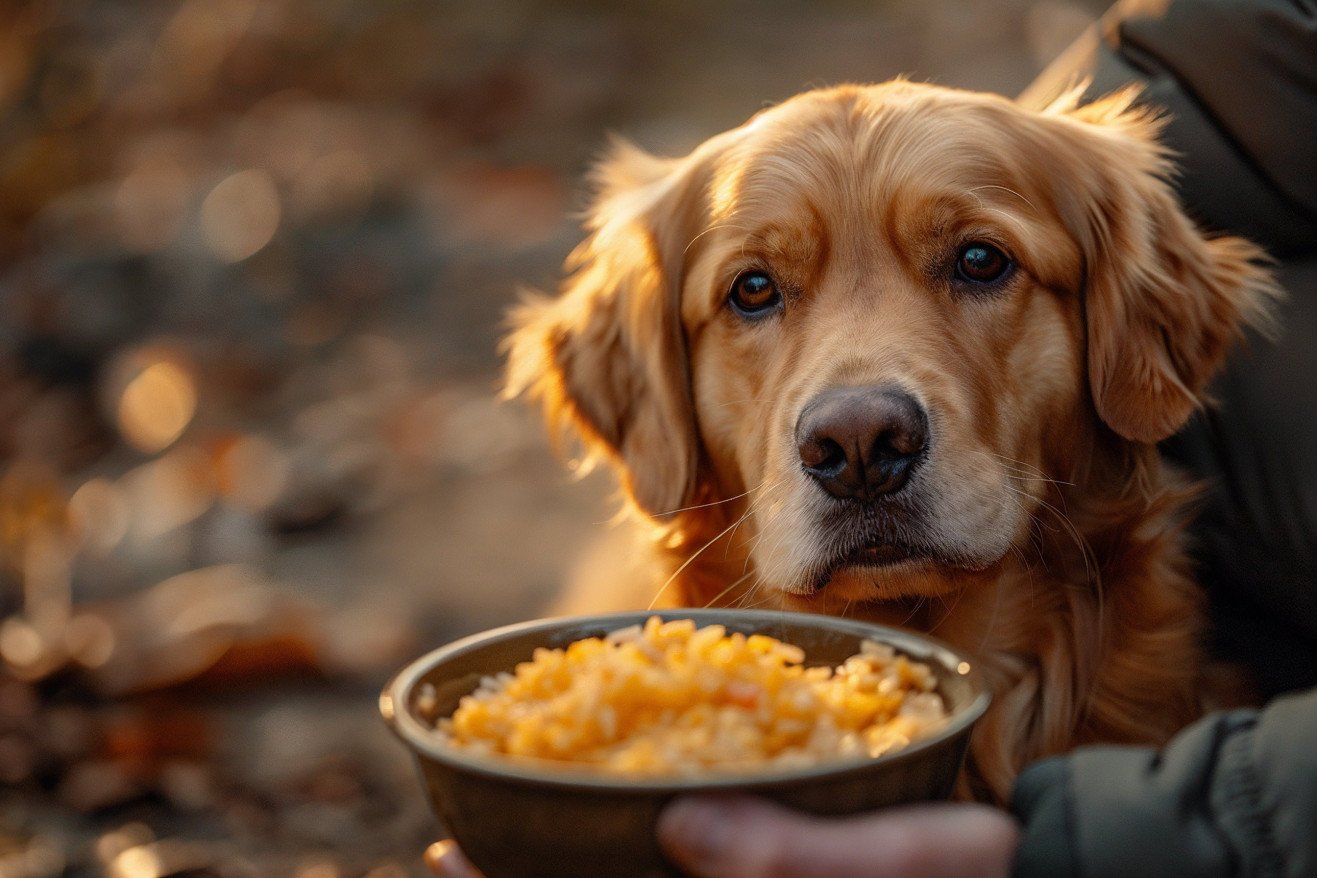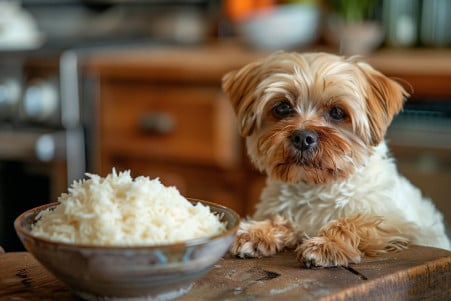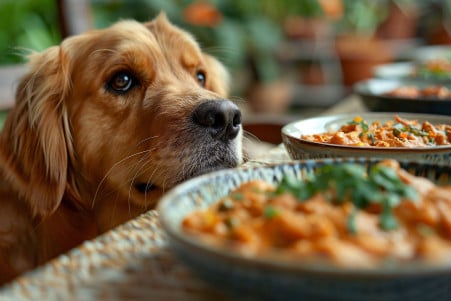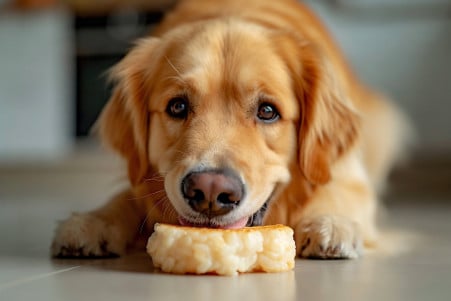Can Dogs Eat Yellow Rice? What to Know
31 May 2024 • Updated 29 May 2024

If you’ve ever been eating a bowl of yellow rice and noticed your dog staring at you, you may have asked yourself if it’s OK to give them some. While it’s fine to give your dog yellow rice as a treat, it’s important to remember that it’s not nutritionally complete and should only be given to your pet in moderation.
This article looks at information from veterinarians and studies about dog nutrition and digestion to help you better understand the potential risks and rewards of giving your dog yellow rice, as well as how much you should give them and how to incorporate it into their diet.
Can dogs eat yellow rice?
Turmeric: What Are the Benefits of This Popular Spice?
Turmeric is the spice that gives yellow rice its color and it has many potential health benefits for dogs. This is because turmeric contains curcumin, which has powerful anti-inflammatory, antioxidant, and antimicrobial effects. When used in the right way and with the guidance of a vet, turmeric can be used to help improve your dog's health in a number of different areas.
Turmeric has been shown to help with a variety of different health issues in dogs, including osteoarthritis, gastrointestinal diseases, diabetes, and even cancer. In fact, one study found that turmeric's anti-inflammatory effects are similar to those of ibuprofen, but without the negative side effects.
The typical dosage is 1/8 to 1/4 teaspoon per 10 lbs of body weight, and while side effects are rare, and include things like stomach upset, it's important to start with a small amount and monitor your dog. It's also best to use dog-specific supplements over human supplements, and turmeric can be given to dogs in their food, water, or as a treat.
Saffron: A Potential Risk or a Harmless Spice for Dogs?
Saffron is another spice used in yellow rice and is considered potentially toxic to dogs in large quantities. The compounds in saffron, including safranal, are toxic to dogs and can lead to kidney failure, anemia, and depression. While the amount of saffron in most dishes is unlikely to cause harm, it's best to avoid giving saffron to dogs to be safe.
Dogs that have ingested a large amount of saffron may need to be treated by a veterinarian with fluid therapy. According to FirstVet, the toxicity of saffron to dogs is not well-documented, but most cases of pure saffron exposure have led to gastrointestinal upset. However, research has shown that the lethal dose of saffron for dogs is 20 grams. Dog owners should seek veterinary care immediately if their dog has eaten saffron and is vomiting, has diarrhea, has a loss of appetite, or is lethargic.
What to Do If Your Dog Eats Yellow Rice
If your dog eats a large amount of yellow rice, it's important to watch for signs of toxicity or allergic reactions. According to the Merck Veterinary Manual, symptoms of aflatoxicosis, which is caused by toxic aflatoxin exposure, can include vomiting, depression, hemorrhage, and jaundice.
Rice allergies in dogs can also lead to itchy skin, hair loss, ear infections, and digestive issues, according to WagWalking. A rice allergy may be diagnosed through a dietary trial to see if the symptoms go away after removing rice from the diet.
If your dog experiences any symptoms after eating yellow rice, make sure to call your vet right away so they can provide the proper treatment and care. This may include supportive care, like a balanced diet and liver support, in the case of toxicity or a severe allergic reaction.
Safe Alternatives: Making Rice Dishes for Your Dog
Although yellow rice isn't the best option for dogs, there are ways to make rice dishes that are safe for your pup. The Honest Kitchen says that plain white or brown rice that's cooked with no salt, spices, or other seasonings can be a nutritious and easily digestible choice for dogs.
Owners should stay away from feeding their dogs fried rice or rice dishes that contain onions, garlic, or too much salt, as these can be toxic or harmful to dogs. Spoiled Hounds says that if you're making rice dishes for your dog, you should use very little tomato or other safe ingredients and avoid oils, seasonings, and unhealthy additives.
Make sure to talk to your vet to make sure that any rice dishes you make for your dog are safe for their dietary needs and any health issues they may have, says Whole Dog Journal.
Everything in Moderation: Portion Control for Yellow Rice
While yellow rice can be OK for dogs to eat in moderation, it's important to be mindful of portion sizes and not to overdo it. As Yaseen Mills explains, most vets will say that you should be careful when giving your dog yellow rice and avoid it if it has any harmful ingredients like onions and garlic.
If the yellow rice is plain and doesn't have any spices or other ingredients, it can be given to dogs as a treat, but it shouldn't be a regular part of their diet. Spoiled Hounds says that when you do give your dog yellow rice, you should start with a small amount and then gradually increase it while watching for any signs of an allergic reaction or digestive problems.
It's important to talk to your vet to find out how much yellow rice your dog can eat based on their size, age, and other dietary factors. Can Dogs Eat Yellow Rice? Safe for Your Pup? explains that you should always make sure to control the portions and get your vet's input before giving your dog yellow rice.
Conclusion: How to Safely Feed Dogs Yellow Rice
While it's safe to feed dogs yellow rice in moderation, there are several important things to keep in mind. First, make sure that you're only feeding your dog yellow rice that's free from toxic ingredients like onions, garlic, or too much salt, as these can all be harmful to dogs. In addition, while turmeric can have some health benefits, saffron can be dangerous in large quantities.
As always, make sure to watch for allergic reactions or signs of toxicity when you first start feeding your dog yellow rice. And, if you're unsure about whether or not yellow rice is safe for your dog, talk to your vet. They can help you determine whether or not yellow rice is safe for your dog based on their individual dietary needs and health concerns.


